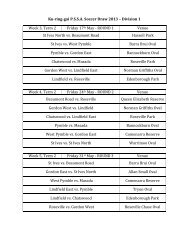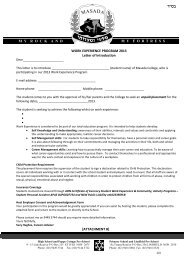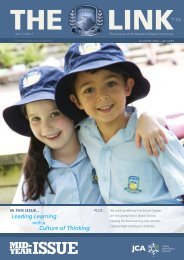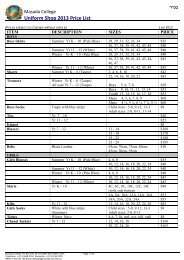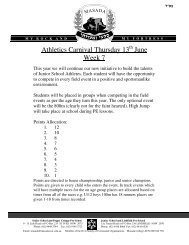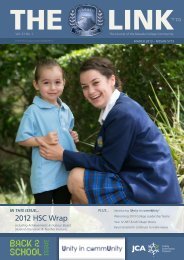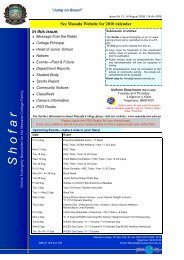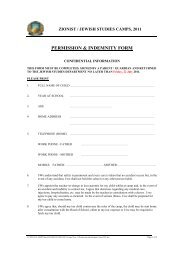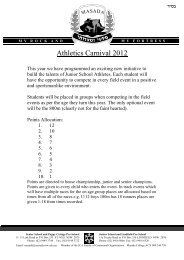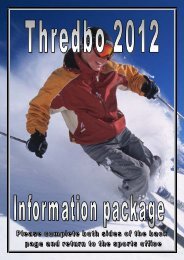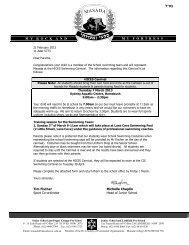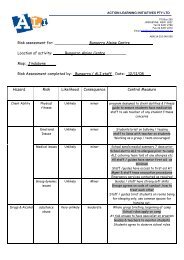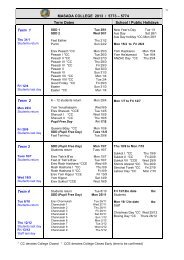Educational and Financial Report - Masada College
Educational and Financial Report - Masada College
Educational and Financial Report - Masada College
Create successful ePaper yourself
Turn your PDF publications into a flip-book with our unique Google optimized e-Paper software.
<strong>Educational</strong> <strong>and</strong> <strong>Financial</strong> <strong>Report</strong>ingPolicy<strong>Masada</strong> will maintain the relevant data <strong>and</strong> will comply with reporting requirements of the NSW Minister for Education <strong>and</strong> Training<strong>and</strong> the Commonwealth Department of Education, Science <strong>and</strong> Training. This reporting will include public disclosure of theeducational <strong>and</strong> financial performance measures <strong>and</strong> policies of the school as required from time to time.ProceduresAnnual <strong>Report</strong>Procedures for implementing the policy include:♦ identification of the staff member responsible forco-ordinating the final preparation <strong>and</strong> distribution of theannual report to the Board <strong>and</strong> other stakeholders asrequired (<strong>College</strong> Principal)♦♦♦♦♦for each reporting area, identification of the staff memberresponsible for the collection, analysis <strong>and</strong> storage of therelevant data <strong>and</strong> for providing the relevant information tothe coordinator for inclusion in the report(PA, to <strong>College</strong> Principal)determination of the specific content to be included ineach section of the report <strong>and</strong> reviewing this each year toensure ongoing compliance, relevance <strong>and</strong> usefulness(<strong>College</strong> Principal)preparation of the report in an appropriate form to sendto the Board of Studies (PA, to <strong>College</strong> Principal).setting the annual schedule for — delivery of informationfor each reporting area to the coordinator — preparation<strong>and</strong> publication of the report (PA, to <strong>College</strong> Principal)distribution of the report to the Board of Studies <strong>and</strong>other stakeholders (PA, to <strong>College</strong> Principal)Requests for additional data from the NSWMinister for EducationTo ensure that any requests from the Minister for additionaldata are dealt with appropriately, responsible for coordinatingthe school’s response. This <strong>College</strong> Principal will beresponsible for the collection of the relevant data <strong>and</strong> for ensuringit is provided to the Board of Studies in an appropriateelectronic form.DEEWR Annual <strong>Financial</strong> ReturnThe <strong>College</strong>’s Business Administrator will be the staff memberresponsible for completing the questionnaire. This BusinessAdministrator is responsible for the collection of the relevantdata <strong>and</strong> for ensuring it is provided to DEEWR in anappropriate form.3
<strong>Report</strong>ing Area 1 cont: A message from key school bodies<strong>College</strong> Principal / Head of Senior SchoolToday’s the day, YOU lead the way echoes so well <strong>Masada</strong>’s Leader in Me philosophy. Each child has <strong>and</strong> can recognise their own, unique strength <strong>and</strong> ithas given us great pleasure over the course of 2011 to see our students lead in such diverse ways.As always we had our recognised leaders, prefects, madrichim, house captains, peer support, SRC representatives <strong>and</strong> the list goes on. We had ourcommunity recognised leaders including our school captain Danielle Sussman who won the Zonta award, Stephanie Zwi, Yr 11, who was chosen as anAustralian representative by the British Council for the Global Changes Award, Lauren Satill, Yr 11, who was awarded a place on the United Nations YouthAssociation Pacific Project <strong>and</strong> our six Yr12 students who achieved gold in their Duke of Edinburgh.And then we had all those students, from Preschool to Yr12, who through their proactive approach to their Judaism, friendship, charity, kindness, musical,sporting, public speaking, debating, social justice, dancing or organisational skills, have found the leader in themselves <strong>and</strong> in doing so enriched not onlytheir own lives but the soul of <strong>Masada</strong> <strong>College</strong>.<strong>Masada</strong> <strong>College</strong> in 2011, introduced The Leader in Me exchange program with Donna Klein Jewish Academy in Boca Raton, Florida. Emma <strong>and</strong> Shir joinedus in July <strong>and</strong> we have three students eagerly anticipating their stay in Boca in January 2012.Another highlight of 2011 was <strong>Masada</strong> hosting the 30 th United Nations Peace Day celebrations, with special guest speaker the Honourable Nathan Rees,<strong>and</strong> representatives from 10 schools partaking in this special ceremony.An invitation from Israel’s ambassador to Australia, Yuval Rotem, to <strong>Masada</strong> students for the opening of the final miniature model to be included inCockington Green, Canberra, Mt <strong>Masada</strong>, was a day all present will always remember.<strong>Masada</strong> <strong>College</strong> itself has continued to lead the way educationally, through our Leading Learning educational package. We continue to lead other schools ina Culture of Thinking, having established <strong>and</strong> pioneered a Collaborative CoT Group, which now has over twelve school members. Plans are already in placefor our second Culture of Thinking Conference in February 2012.We continue to lead the way with our introduction of The Leader in Me into a preschool to Yr 12 context <strong>and</strong> hope in 2012 to move closer to becoming aCovey Lighthouse School, recognised internationally as leading the way in this approach.Our continual success in providing more opportunities for our students both in <strong>and</strong> out of the classroom only comes through the synergy that exists at<strong>Masada</strong>. Thank you to our <strong>College</strong> executive who have embraced our Leading Learning educational package <strong>and</strong> continually strive to enhance it, ourteaching staff for their dedication <strong>and</strong> enthusiasm in implementing it <strong>and</strong> our administrative <strong>and</strong> maintenance teams who are the strength behind the scenes.A great vote of appreciation is extended to our generous sponsor, Mrs Millie Phillips, whose enthusiasm <strong>and</strong> support has provided staff at the Senior Schoolthe opportunity to follow on from the Junior School with The Leader in Me training. Behind all that we do is <strong>Masada</strong> <strong>College</strong>’s Board of Management, so ablyled by Mr Trevor Lorge, providing us with endless support <strong>and</strong> encouragement, continuing to inspire <strong>and</strong> guide us as we move from strength to strength,confident in the knowledge that Today is the day, WE lead the way.Wendy Barel<strong>College</strong> Principal, Head of Senior School5
<strong>Report</strong>ing Area 1 cont: A message from key school bodiesSchool Captains<strong>Masada</strong> <strong>College</strong> is a school built upon warmth <strong>and</strong> community, having served us, the Class of 2011, as much more than just an outst<strong>and</strong>ing educationalfacility. For each of us <strong>Masada</strong> has acted as a second home <strong>and</strong> a place where every single student’s unique talents have been nurtured <strong>and</strong> appreciated.This is year we have been given the greatest opportunity as leaders in the <strong>College</strong>, able to celebrate the student body, our school <strong>and</strong> heritage through arange of prefect initiatives. We began this year eager to instil <strong>and</strong> nourish the leadership potential of each <strong>Masada</strong> student, coining the phrase, Today’s theday, YOU lead the way,” Our leader of the month award, based upon Steven Covey’s The Leader in Me Program, has sought to celebrate the leadershipqualities exhibited by students of all ages in the high school, presenting them with a montage of footage in their honour. We were able to reinvent thetraditional Shavuot dinner, by injecting an exotic Bedouin theme in into the evening. We created a fantastically magical fairy-tale themed Purim Ball <strong>and</strong>serenaded unsuspecting students on Friendship Day. We have maintained awareness in the <strong>College</strong> of Israeli current affairs through our regular Israel newssegments <strong>and</strong> have worked, harder than ever to inspire a greater sense of decorum <strong>and</strong> involvement in prayers.During our time at <strong>Masada</strong> we have been immersed in a culture of education, effort <strong>and</strong> excellence, merged with a camaraderie <strong>and</strong> friendship. Through bothformal <strong>and</strong> informal Jewish Studies education, a passion <strong>and</strong> love for Judaism <strong>and</strong> Israel has been engrained in each of us, fostering a sense of pride in ourpeople’s past <strong>and</strong> determination to shape our future.Our time spent at <strong>Masada</strong> <strong>College</strong> has been shaped by the commitment of our teachers, to whom we are eternally grateful. The school has instilled in us thevalue <strong>and</strong> benefit of education <strong>and</strong> diligence. Our school represents a piece of our identity, a source responsible for contributing to our development <strong>and</strong>growth as people. Academically we have been nourished; emotionally we have been nurtured, socially we have been blessed <strong>and</strong> individually we have beenprivileged to have spent our formative years at a school like ours.2011 has been an exciting year for the <strong>College</strong> <strong>and</strong> we are ecstatic to have been a part of it.Mark Velik <strong>and</strong> Danielle SussmanSenior School CaptainsMark Velik, Wendy Barel, <strong>College</strong> Principal &Danielle Sussman6
<strong>Report</strong>ing Area 2: Contextual Information about <strong>Masada</strong> <strong>College</strong><strong>Masada</strong> <strong>College</strong> is a coeducational modern orthodox Jewish day school Preschool to Year 12. We develop independent thinkers, through Reggio Emilia &Culture of Thinking pedagogy. Catering for students across the learning spectrum we allow students to reach their potential, support & encourage academicexcellence by offering students a range of learning challenges. Our HSC results consistently place us in the top 20 schools in NSW. <strong>Masada</strong> believes thereis a leader in each child & fosters opportunities for students to take on responsibility & leadership ensuring our graduates are confident, responsible,Australian citizens. <strong>Masada</strong>, through its tolerant, caring & nurturing environment, promotes strong community values, with a specific focus on respect &responsibility. Our Raising Responsibility behavioural management system underpins our values system. Community awareness & involvement is reflectedin the work initiated by our Charity Committee & SRC & the public recognition awarded to our students by external organisations. Our diverse range ofco-curricular programs ensures our success in developing in our students a strong sense of community, pride in their heritage & identity.<strong>Masada</strong> <strong>College</strong> has an:♦ SES score 130♦ We have a strong Learning Support Team who work closely with selected students, staff <strong>and</strong> liaise regularly with parents to ensure their students areprovided with consistent <strong>and</strong> appropriate support. In 2011 there were six students who were recognised in terms of eligibility for integration funding.♦ Our non selective policy means we have children with attributes that range across the learning spectrum. We offer enrichment programs <strong>and</strong> have astrong focus on learning support.♦ Approximately 3.61% ie 12 of our 332 Senior School student enrolments are overseas students who require English as a Second Language support.We have Value Added to our education — below are some of the valued added components:♦ Academic♦ Additional Teaching <strong>and</strong> Learning Opportunities♦ Exposure to Values Education♦ Community Involvement♦ Co-curricular OpportunitiesAcademic♦ Our HSC results in the majority of subject areas showed an improvement in terms of the percentage of students in the top b<strong>and</strong> compared to 2010.♦ <strong>Masada</strong> was placed 6th non selective school in New South Wales <strong>and</strong> 17th overall in New South Wales.♦ 50% of students in our non-selective school gained ATARs over 90 <strong>and</strong> 70% over 80.♦ Our NAPLAN results, particularly in Year 3 & 5 were very strong with a marked improvement of Year 5 students on their Year 3 results. We wereplaced 2nd in NSW for our Primary School results.♦ Our Reading Plus program continues to support students with their reading speed <strong>and</strong> comprehension <strong>and</strong> perception levels with noticeableimprovements resulting.♦ Gabriella Shofer & Mark Velik won Co-op Scholarships to University of New South Wales <strong>and</strong> Br<strong>and</strong>on Cowan Co-op Scholarship to UTS♦ Our Hospitality student Jess Broll won a scholarship to William Blue Hospitality.♦ Jonathan Felthun was awarded the Department of Education award for Academic Excellence.♦ Six Visual Art students were short listed for ArtExpress <strong>and</strong> three were selected for exhibition, Carly Br<strong>and</strong>, Jacob Hirsh <strong>and</strong> Gabriella Shofer♦ Shir Dekl , Year 11 topped the State in HSC in Modern Hebrew♦ Jonathan Felthun was placed 10th in the State in HSC for Biology♦ Monique Heller <strong>and</strong> Lori Gross were placed 10th in the State in HSC for Business Studies7
<strong>Report</strong>ing Area 2: Value addedAdditional Teaching <strong>and</strong> Learning Opportunities♦ Starting the year with a Leader in Me day where students reflected on the 7 Habits of Highly Effective People <strong>and</strong> started with the End in Mind, goalsetting for Semester 1♦ In a variety of external competitions, including ICAS assessment, Australian Mathematics Competition our students gained Distinctions <strong>and</strong> HighDistinctions♦ Our Years 5 /6, 7/8, 9/10 all participated in the Da Vinci Decathlon♦ <strong>Masada</strong> Year 10 students enjoyed a visit from the Arava students from Israel <strong>and</strong> one of our teachers, Adi Halevi, spent a month in Arava, Israel.This exposed our students directly to the culture <strong>and</strong> language of Israel♦ We introduced a <strong>Masada</strong> Creative Writing Competition which all of our Year 7—10 students entered♦ For the first time <strong>Masada</strong> <strong>College</strong> participated in the HICES Music Festival♦ All the Senior School Students <strong>and</strong> staff enjoyed a visit <strong>and</strong> a very informative Assembly with Dr Karl♦ A Science Club was established for interested students in the senior school to provide opportunities for h<strong>and</strong>s on experiments after school♦ A Scholars Club was established for Year 12 students to provide them additional essay writing support♦ Junior School students successfully entered Tournament of the Minds♦ Special days to promote curriculum areas <strong>and</strong> allow students to have uninterrupted time to develop skills <strong>and</strong> ideas relating to subject areas. OurCreative Arts Camp, Jewish Studies Camps, Mathematics Day (Year 7 & 8), Hebrew Days <strong>and</strong> M<strong>and</strong>arin Day were very successful, as was ourMedieval Day for our Year 7 / 8 History students♦ Mrs Jill Rennie, was recognised by the Australian <strong>College</strong> of Educators for her outst<strong>and</strong>ing contribution to education in Food Technology <strong>and</strong>HospitalityExposure to Values Education♦ There was a continuation of our programs which included opportunities for our students to be involved in <strong>and</strong> or exposed to Interfaith, Indigenous,Environmental, Inter-Generational <strong>and</strong> Special Needs projects♦ Our well supported Charity Committee was not only involved in fund raising but in a program of deeds to support the needy in our community, theNorth Shore Chesed program. This involves regular cooking <strong>and</strong> distribution of meals, as well as a variety of other services♦ There was a whole <strong>College</strong> directed focus on Values—most notably valuing the need to do your best at all times which culminated in an assembly forour 7 Habits afternoon♦ Our continued development in the Leader in Me Program provided staff <strong>and</strong> students with a framework <strong>and</strong> language for “effectiveness” <strong>and</strong>leadership♦ An exchange program between <strong>Masada</strong> <strong>College</strong> <strong>and</strong> Donna Klein Jewish Academy, Florida was launched with two students joining us in June <strong>and</strong>three of our students visiting the USA in December / January♦ <strong>Masada</strong> <strong>College</strong> hosted the United Nations Peace Day Ceremony in collaboration with Biannca Pace from the Ministry for Peace♦ <strong>Masada</strong> students featured at the Martin Place Peace Day celebrations♦ Lauren Satill, Year 11 was chosen to be part of the United Nations Pacific Program in East Timor♦ Stephanie Zwi, Year 11 was the only Australian selected by the British Council to represent Australia in London at the Youth Forum♦ Our weekly assembly message <strong>and</strong> fortnightly newsletter message from the Rabbi focuses on values♦ Participated in Voices for Reconciliation, an indigenous initiative by Ku-ring-gai Council8
<strong>Report</strong>ing Area 2: Value addedCommunity Involvement♦ <strong>Masada</strong> students participated in the Ku-ring-gai Youth Forum♦ Parents were provided with opportunities to learn <strong>and</strong> work with their children around social issues including cyber bullying, safe internet use, drugs,alcohol <strong>and</strong> safe partying♦ Community <strong>and</strong> social awareness was highlighted by our Senior students’ involvement in their ReBow Committee, Rebuilidng our World, with a focus onSave a Child’s Heart♦ Daniella Sussman was the Winner of the Zonta Award for Ku-ring-gai <strong>and</strong> Runner Up for NSW Zonta♦ Our Year 12 students’ involvement in Camp Sababa, a four day retreat for children with special needs gives our students excellent training <strong>and</strong> insightinto the needs of the children <strong>and</strong> their families♦ Our Year 10 Fashion Show, the 2011 class through their show, Fashion Your Seatbelts, raised large sums for Stewart House♦ Our Year 9 students spent a day at St Edmunds school, a school for students with disabilities♦ Our Junior School students performed for residents at the Montefiore Aged Care home <strong>and</strong> our Senior Students visited residents♦ Volunteered services at the Sydney City 2 Surf♦ Our students were involved in SOS, Youth Off the Streets, in augural event♦ Our students volunteered for Jewish Communal Appeal functions, Green Sunday, Legacy DayCo-Curricular Opportunities♦ A growing percentage of students choose to take extra challenges ie Duke of Edinburgh—with a record number attaining Gold♦ Daniella Sussman Year 12 was awarded from the Order of Australia Association NSW Branch—The Certificate of Commendation for Service to theCommunity♦ Our students were offered a variety of opportunities in public speaking. All students participated in the <strong>Masada</strong> Public Speaking Competition, as well asstudents entering Legacy, Sydney Morning Herald, Lions <strong>and</strong> Rostrum♦ Our annual film making competition, <strong>Masada</strong>fest, provided another opportunity for teamwork <strong>and</strong> students to share <strong>and</strong> show their talent♦ <strong>Masada</strong> students Ashleigh Vissel, Gina Glazer <strong>and</strong> Elsa Chapple won the Rotary Youth Speaks Out award for the 2nd consecutive year♦ Rebecca Lumbroso, Year 11 was a finalist <strong>and</strong> awarded a prize from the University of Wollongong for the “Creative WOW Factor Award “for DAT MajorWork♦ All our students are offered the opportunity to attend a Ski Camp in the mid year break♦ A lunch time club program was introduced in the Junior school <strong>and</strong> included Hip Hop, Knitting, Ball Games <strong>and</strong> Glee classes♦ Students are offered chess club, debating, environment clubs <strong>and</strong> a range of sporting programs9
<strong>Report</strong>ing Area 3: Student performance in Statewide or equivalent tests <strong>and</strong> examinationsHigher School Certificate * Subjects results in top b<strong>and</strong>(s) greater than in 2011 HSC ** Improve in top 2 b<strong>and</strong>sSubjectNo of<strong>Masada</strong>studentsTop 2b<strong>and</strong>s<strong>Masada</strong>%Top 2b<strong>and</strong>s(State) %** Ancient History 10 60 37same Biology 6 100 20Business Studies 25 76 32* Chemistry 15 47 39SubjectSubjectNo of<strong>Masada</strong> studentsTop 2 b<strong>and</strong>s<strong>Masada</strong> %Top 2B<strong>and</strong>s (State) %* Modern History 10 100 45* History Extension 3 100 72* Music 1 3 100 59* PDHPE 14 64 35Classical Hebrew 3 33 61* Classical Hebrew Extn 3 100 100Design & Technology 9 33 38** Economics 11 91 43* English (Adv) 39 97 58** English (Std) 23 35 9ESL 7 57 32** English (Ext1) 16 94 83* English (Ext2) 8 100 83* Food Technology 7 57 26Hospitality 9 67 34Mathematics General 26 62 24Mathematics 18 83 51* Mathematics (Ext1) 20 100 84sameMathematics (Ext2) 11 100 92* Modern Hebrew 10 100 98ExternalStudiesPhysics 11 27 36* Society <strong>and</strong>Culture* Studies ofReligion10 90 3312 67 47* Visual Arts 20 100 48* Accounting 20 75 53JapaneseBeginnersChineseContinuers1 100 401 100 77Chinese Extn 1 100 96* Korean BackgroundSpeakerssame1 100 70Industrial Tech 2 50 30Software Design& Development2 100 2510
<strong>Report</strong>ing Area 3: Student performance in Statewide or equivalent tests <strong>and</strong> examinationsHigher School CertificateAccording to the Sydney MorningHerald HSC results analysis:♦♦♦♦<strong>Masada</strong> was placed 17th inNSW50% over 90.0 ATAR70% over 80.0 ATAR7th in Mathematics(non selective)State Individual Achievements:♦ 1st in Modern HebrewShir Dekel Year 11♦ 10th in BiologyJonathan Felthun♦ 10th in Business StudiesMonique Heller <strong>and</strong> Lori Gross♦ 10th in Visual Arts,Gabriella ShoferNSW Non selective schools♦ First co-educational school onthe North Shore♦ Sixth overall in NSW♦ Seventh in Mathematics♦ Fourteenth in EnglishThe School is not provided withATARs. We rely on students phoningin their results. Some studentsdespite getting ATARs over 95 haverequested their results be withheldfrom publication.All RounderAchievers ListEquivalent of five subjectsabove 90ATARJohn Park 99.80Jonathan Felthun 99.75Gabriella Shofer 99.45Mark Velik 99.45Zachary Schwartz 99.40Monique Heller 99.30Dean Zinn 98.05Jonty De Klerk 97.95Tal Prigan 97.95Gregory Joffe 97.80Carly Br<strong>and</strong> 97.25Weiho (Luke) Xia 97.05Gidon Kangisser 95.55David Hommersom 95.30Jacob Hirsh 94.10Aimee Gordon 93.75Guy Bortz 92.80Br<strong>and</strong>on Cowan 91.60Dani Glasser 90.65Chloe Marks 89.20<strong>Masada</strong> <strong>College</strong> - had a very positive <strong>and</strong> productiveyear of growth which fittingly concluded with once againoutst<strong>and</strong>ing HSC results.<strong>Masada</strong> <strong>College</strong> has been consistently represented in:♦♦ArtExpress <strong>and</strong> we once again were delighted tohave six of our c<strong>and</strong>idates short listed <strong>and</strong> threechosen for exhibitionThree students selected for Art Express:Carly Br<strong>and</strong>, Jacob Hirsh & Gabriella Shofer.Scholarships/Cadetships♦ Gabriella Shofer, Mark Velik won Co-opScholarships to University of New South Wales <strong>and</strong>Br<strong>and</strong>on Cowan Co-op Scholarship to UTS♦ Jess Broll won a scholarship to William BlueHospitality CourseLeaders in Life♦ Youth OAM Medal four consecutive years♦ ZONTA Finalists every year♦ Companions at Camp Sababa♦ Seven Year 12 Gold Achieved in theDuke of Edinburgh Program11
<strong>Report</strong>ing Area 3: Student performance in Statewide or equivalent tests <strong>and</strong> examinationsSchool Certificate 2011Subject B<strong>and</strong> 6%(<strong>Masada</strong>)B<strong>and</strong> 6%(State)B<strong>and</strong> 5%(<strong>Masada</strong>)B<strong>and</strong> 5%(State)B<strong>and</strong> 4%(<strong>Masada</strong>)B<strong>and</strong> 4%(State)MediansEnglish 9 5 42 34 45 45 79Mathematics 14 9 37 17 31 21 79Science 24 9 39 25 30 35 83Australian History 15 5 22 21 36 31 76Australian Geography 25 5 24 20 29 32 79SubjectHighly Competent Competent Median<strong>Masada</strong> State <strong>Masada</strong> StateComputer Skills 73 52 25 438When compared to the 2010 results there was a 17% increase in the top b<strong>and</strong> in History & Geography.Performance on NAPLAN is documented on the My School website http://www.myschool.edu.au both High <strong>and</strong> Primary schools are listed on the siteunder <strong>Masada</strong> <strong>College</strong> Lindfield.12
<strong>Report</strong>ing Area 4: Senior Secondary OutcomesIn 2011 50% of the Year 12 cohort participated in vocational or trade training, the majority being in Accounting <strong>and</strong> Hospitality.Year 12 attaining a certificate / VET qualification on completion of Year 12.Year 12 Qualification / Certificate Percentage of Students2011 HSC 100%2011 VET 100%13
<strong>Report</strong>ing Area 5: Professional learning <strong>and</strong> teacher st<strong>and</strong>ardsTeaching St<strong>and</strong>ardsCategoryTeachers who have teaching qualifications from a higher education institution within Australia or as recognisedwithin the National Office of Overseas Skills Recognition (AEINOOSR) guidelinesTeachers who have qualifications as a graduate from a higher education institution within Australia or onerecognised within the AEI-NOOSR guidelines but lack formal teacher education qualificationsTeachers who do not have qualifications as described in (a) <strong>and</strong> (b) but have relevant successful teaching experienceor appropriate knowledge relevant to the teaching context.Professional Learning At <strong>Masada</strong> <strong>College</strong> staff professional development is seen as ongoing <strong>and</strong> central to success for both teaching <strong>and</strong> learning. As we develop ourLeading Learning <strong>Masada</strong> <strong>Educational</strong> Package, all our staff are involved in ongoing Professional Development. Each staff member is in a focus group which meetsfortnightly as part of our Culture of Thinking <strong>and</strong> this is a Professional Development opportunity <strong>and</strong> has greatly increased professional dialogue amongst staff. Theintroduction of all staff to Stephen Covey’s 7 Habits of Highly Effective People began another platform of whole staff professional development. All staff have had the fulltwo day training <strong>and</strong> in 2011 three staff were trained to become facilitators. Staff are also encouraged to nominate courses (Association of Independent Schools or others)which are relevant to their needs. A large percentage of staff (up to 1/3rd in our Senior School) are involved in Board of Studies in exam setting <strong>and</strong> marking whichprovides outst<strong>and</strong>ing Professional Development opportunities in terms of st<strong>and</strong>ard setting <strong>and</strong> peer contacts. Our New Scheme teachers have ongoing mentoring as theyprepare <strong>and</strong> work towards the st<strong>and</strong>ards set by the Institute of Teachers. In 2011 three staff completed the process. In 2011 approximately $85,000 was spent onprofessional learning; averaging $1,062.50 per teacher.♦♦♦♦♦♦♦♦♦♦♦♦♦♦♦♦♦IT training for all staff continues in house as well as through external providers, with a particular focus on interactive whiteboards <strong>and</strong> use of our <strong>College</strong> intranet IRockNew staff attended professional development courses <strong>and</strong> induction in houseNew staff <strong>and</strong> current staff offered “meet the Rabbi” sessionsCulture of Thinking Focus Groups continued meeting, with the introduction of socratic questioning <strong>and</strong> Bloom’s taxonomy. Thinking posters were developed by staff, produced <strong>and</strong>placed in all classroomsTal Am, Hebrew training programs were offered to Hebrew staff in the Junior School <strong>and</strong> in the Senior School NETA mentorship continued, as well as staff being trained in the UlpanOr programClassroom management mentorship was provided for less experienced staffInteractive Whiteboard—instruction to selected staff in Senior School <strong>and</strong> all Junior School staffExecutive members attended termly AHISA, IPSHA <strong>and</strong> HICES meetings to keep updated <strong>and</strong> to develop collegial ties <strong>and</strong> referencesThree staff members were trained as facilitators from Franklin Covey’s 7 Habits of Highly Effective peopleAll Senior school staff were provided with two days full training in the 7 Habits <strong>and</strong> one vision / implementation daySeveral staff members were involved in the consultative process for the Australian Curriculum developments<strong>College</strong> Principal visited Varsity <strong>College</strong> in Queensl<strong>and</strong> to see another Leader in Me School in action<strong>College</strong> Principal attended AHISA Bi-Annual Conference in AdelaideThree Executive staff attended Bialik <strong>College</strong>’s third Culture of Thinking Conference at which one of our these staff members presented<strong>College</strong> Principal, Deputy Head of Senior School & Head of Junior School attended a ten day Israel Study tour in December / JanuaryStaff attended subject specific courses, primarily through the Association of Independent SchoolsMembers of staff from Administration <strong>and</strong> Maintenance commenced courses with the Applied Training Solutions group, one - Frontline Management; four—Certificate IV in Business;3 - Diploma of Management14Quantity7150
<strong>Report</strong>ing Area 6: 2011 Workplace composition, including Indigenous♦ Total teaching staff full time equivalent Senior 33.9 Junior 15.7♦ Total ancillary staff full time equivalent Senior 18.6 Junior 5.2<strong>Report</strong>ing Area 7: Student attendance <strong>and</strong> retention rates in secondary schoolsIt is the policy of <strong>Masada</strong> <strong>College</strong> that an accurate record of daily attendance is maintained using the facility of an online attendance system.All parents, Preschool to Year 12, are expected to support the <strong>College</strong>’s rules.AbsencesAdvance NotificationIf parents know in advance that a child is going to be absent from school for any reason, they should notify the Head of the relevant section of the <strong>College</strong> assoon as possible. Parents may not take children on extended holidays in term time without written permission. The Head of School will only grant permissionfor such holidays in exceptional circumstances. Students who are absent during exam/assessment periods will be issued with an estimated mark <strong>and</strong>separate examinations will not be provided for them.Absence notesOn the day of his/her return to school, a child must bring a note from home. The note must include the date of the absence, the reason for the absence <strong>and</strong>in the case of illness, the nature of the illness.In the Senior School absence notes must be h<strong>and</strong>ed in to the Office before recess.In the Junior School absence notes must be h<strong>and</strong>ed in to the class teacher in Years K – 6.Telephonic Notification to the <strong>College</strong>Parents whose child will not be attending school for any reason, other than where leave has been granted, are required to telephone the Junior or SeniorSchool <strong>and</strong> leave a message on the answering machine or with the office staff, before 8.30am. This is obviously not necessary where the school knows thereason in advance of the child’s absence, but it will assist the office staff in following up absentees later in the morning.Should there be no correspondence from parents by 12 noon an SMS is sent to Senior School parents alerting them of the student’s absence <strong>and</strong> requestingfeedback <strong>and</strong> a call is made to Junior school parents.Late NotesThese are only acceptable if the reasons given are legitimate ones. Excuses such as 'woke up late' or 'missed the bus' will not prevent the student frombeing punished <strong>and</strong> students will be expected to catch-up on any work missed. Staff believe that students from Year 3 onwards are old enough to takeresponsibility for their actions <strong>and</strong> students should not seek their parents’ help in defying school regulations.15
<strong>Report</strong>ing Area 7: cont page 17 Student attendance & retention rates in secondary schoolsThe retention rate of students at <strong>Masada</strong> is always very high. Nearly all students have high academic aspirations <strong>and</strong> continue through toYear 12. This has been a consistent pattern.Year Level Absence Rate %Kindergarten 5Year 1 4Year 2 4Year 3 4Year 4 2Year 5 5Year 6 4Year 7 5Year 8 4Year 9 5Year 10 5Year 11 6Year 12 6Overall 4%YearsComparedYear 10enrolment on censusStudent AttendanceYear 12 enrolment2011Year 10 enrolment atcensus date remainingin year 12 oncensus dateApparentRetentionRateActualRetentionRate2009 / 2011 65 70 59 107.7 90.8%2008 / 2011 60 64 54 106.7 90.0%2007 / 2009 57 59 54 103.5 94.7%2006 / 2008 60 61 55 101.7 91.7%2005 / 2007 63 56 55 88.9% 87.3%2004 / 2006 77 72 68 93.5% 88.3%2003 / 2005 83 87 83 104.8% 100.0%2002 / 2004 56 59 55 105.4% 98.2%2001 / 2003 83 75 73 90.4% 88.0%The majority of students who left <strong>Masada</strong> in the period from Year 10 to Year 12 students, transferred to other schools rather than joining theworkforce. Year 10 has in recent years become an entry year, hence the high actual retention rate.16
<strong>Report</strong>ing Area 8: Post school destinationsNearly all <strong>Masada</strong> students continued on to tertiary studies — primarily at Universities, but also at specialised private colleges <strong>and</strong> TAFE.In 2011 there were 70 students completing the HSC. Of these students 40 were accepted into university courses in Australia.Below is a table outlining the degree choices of the 2011 cohort <strong>and</strong> the percentage of students selecting each degree.We are unable to track the destination of some of our overseas students who returned to their homel<strong>and</strong> for tertiary studies.DegreeAreas of selectionDegrees % studentsPlaces were spread across the Universities% at each UniversityUniversity of Technology 22%Business / Finance 28%Hospitality / Events 4%Design / Construction 22%Social Work / Teaching 10%Law 10%University of NSW 19%Sydney University 19%Macquarie University 29%Australian Catholic University 7%Others 4%Science/ Medicine 18%Others 8%17
<strong>Report</strong>ing Area 9: Enrolment policies <strong>and</strong> profiles 2011<strong>Masada</strong> <strong>College</strong> is a comprehensive co-educational Jewish Day School that operates within the policies of the NSW Board of Studies. <strong>Masada</strong> <strong>College</strong> doesnot discriminate with regard to enrolments on the basis of gender, disability or special needs, however the <strong>College</strong> may not be able to accommodate allchildren given the limitations of space, number, specialised facilities <strong>and</strong> special needs teachers. Enrolment is necessary for new students <strong>and</strong> studentsre-entering the <strong>College</strong>. Once students have enrolled they are expected to support the <strong>College</strong>’s ethos <strong>and</strong> abide by <strong>and</strong> respect the <strong>College</strong>’s rules tomaintain their enrolment. Signing the parent agreement is part of the enrolment process.Enrolment ProcedureEnrolment procedure is as follows:Return completed <strong>and</strong> signed Application Form with the Application Fee ($110)The Application Fee is $110 <strong>and</strong> is non-refundable. Applications are dated from the receipt of a completed <strong>and</strong> signed Application Form <strong>and</strong> theaccompanying Fee.Interviews with the relevant Head of School <strong>and</strong> the Business Administrator For students new to the <strong>College</strong>, they <strong>and</strong> their parents must attend aninterview with the relevant Head of School or Deputy Principal (or their nominee). Parents new to the <strong>College</strong> must also attend an interview with the BusinessAdministrator. ESL students have to undergo a language test <strong>and</strong> satisfy a required st<strong>and</strong>ard.A place at <strong>Masada</strong> <strong>College</strong> will be offered if a vacancy exists Offers will be made in approximately June for the following year. Applications forimmediate enrolment will be made subject to availability. Where the <strong>College</strong> is unable to offer a place, the applicant’s name will be placed on a waiting list.Places will be offered in strict order of receipt of the Application Form <strong>and</strong> Fee. Priority is given to siblings of students enrolled in the <strong>College</strong> <strong>and</strong> children of<strong>Masada</strong> graduates.Commitment Deposit ($1000) <strong>and</strong> Security Deposit ($300) A place at <strong>Masada</strong> <strong>College</strong> is accepted with the return of the completed Offer Formaccompanied by a cheque for the Commitment Deposit ($1000). A Security Deposit ($300) will be invoiced with the first term’s fees. The CommitmentDeposit (non-refundable if the student does not take up the accepted place) is deducted from the first term’s fees. The Security Deposit is held until the studentleaves the <strong>College</strong>. For students applying from overseas, any offer of a place made before the interviews is conditional pending satisfactory interviews.Student Population <strong>Masada</strong> <strong>College</strong> 2011 — 539 students, of which 332 were in the Senior & 207 in the Junior Schools. Gender balance whole schoolwas 230 females; 309 males. The <strong>College</strong> enrols Overseas Students however at present they are a minority of the total enrolments 21 (approximately 4%).The majority of whom are in the Senior School. The <strong>College</strong> has some students with special needs however our student population contains a fairly narrowrange of backgrounds. As it is a Jewish school, the majority of our students are Jewish.Continued Enrolment Is dependent on payment of fees <strong>and</strong> respecting the ethos, rules <strong>and</strong> expectations of the <strong>College</strong>.Accessibility Anti Discrimination The <strong>College</strong> will ensure that all new building works will comply with relevant legislation regarding disabled access at thetime of construction. Older buildings not complying with such regulation will be improved over time subject to availability of funds <strong>and</strong> needs. Appropriatetimetabling will be used such that easily accessible General Purpose classrooms are timetabled where disability access is an issue.18
<strong>Report</strong>ing Area 10: School policiesThe Parent Guide <strong>and</strong> the <strong>College</strong> IT server contain the general policies <strong>and</strong> procedures relating to Student Welfare <strong>and</strong> daily expectations.The Policies listed below were not amended in 2011. These include those relating to:♦♦♦♦♦♦♦♦♦♦HomeworkAssessmentHats <strong>and</strong> Sun protectionWelfare PolicyExcursions / IncursionsAccidents <strong>and</strong> IllnessWork Health SafetySick BayAccessibility Anti DiscriminationAnti DiscriminationCity to Surf Volunteers30th United Nations Peace Day Ceremony19
<strong>Report</strong>ing Area 10: School policiesPolicy Changes in 2011 Access to textWelfare PolicyIncludes:<strong>Masada</strong> <strong>College</strong> seeks to provide a safe <strong>and</strong> supportiveenvironment which:• minimize risk of harm <strong>and</strong> ensures students feel secure• supports the physical, social, academic, spiritual <strong>and</strong> emotionaldevelopment of students• provides student welfare policies <strong>and</strong> programs both secular<strong>and</strong> religious that develop a sense of self-worth <strong>and</strong> fosterpersonal development• Ensure procedural fairness is in place♦ Nil 1. Parent Guide2. Student Diary3. Staff H<strong>and</strong>book4. <strong>College</strong> IT ServerSecurity PolicyIncludes:♦ Use of grounds <strong>and</strong> facilities♦ Procedures for ensuring security for grounds <strong>and</strong> buildings,♦ Emergency procedure – includes evacuation procedures, allpersonnel <strong>and</strong> contact lists♦ Lock down procedures♦ Role of security guards♦♦Lock down procedures fine tuned aftereach implementation practice. Temporarilyamended due to change in physicalenvironment.Review ongoing of Security needs <strong>and</strong>proceduresLocation:1. Administration / AccountingH<strong>and</strong>book K – 12 (in full)2. School student diary (partial)3. Referenced in Parent Guide4. Casual staff informal pack5. PSG roster weekly updates onwebsite6. Documentation for lockdownissued to nominated personnel7. <strong>College</strong> IT ServerSupervision PolicyIncludes:♦♦♦♦♦♦♦♦Duty of care <strong>and</strong> risk managementGuidelines for supervisorsDefining of supervision areasSupervision rosters (regularly updated / amended)Levels of supervision for on-site <strong>and</strong> off-site activitiesExcursion proposal <strong>and</strong> permission formsRisk AssessmentsCommunication to visitors to site♦♦♦Regularly updated /amendedBus drop off / pick up arrangements,given further supervision—Peer Supportstudents in mornings, teachers inafternoonsGuidelines issued to visitorsLocation:1. Staff H<strong>and</strong>book updatedannually2. Staff Induction folders, updatedtwice yearly3. Administrative H<strong>and</strong>book4. <strong>College</strong> IT Server5. School entry points20
<strong>Report</strong>ing Area 10: School policiesPolicy Changes in 2011 Access to textPolicy for Information Technologyincludes:♦ Student / Staff Agreement — Acceptable Use Policy for ITequipment that is held at the <strong>College</strong> <strong>and</strong> also personalequipment brought on to campuses.♦Regularly reviewed <strong>and</strong> amended ITusage & policiesLocation:1. Staff H<strong>and</strong>book2. Classrooms3. Parent Guide4. Shofar / school newsletter5. <strong>College</strong> IT ServerCodes of Conduct Policyincludes:♦ Code of conduct for staff <strong>and</strong> students♦ Behaviour management guidelines♦ Anti-bullying policy <strong>and</strong> strategies♦ The role of student leaders♦♦Updated self reflection sheets forstudents to mirror Leader in MeapproachStudent leader h<strong>and</strong>books updatedLocation:1. Staff H<strong>and</strong>book2. Student diary3. Classrooms4. Induction folders5. Parent Guide6. Student Leadership h<strong>and</strong>books7. <strong>College</strong> IT ServerPastoral Care Policyincludes:♦ Pastoral Care System – Year Patrons, Patron meetings,Parent / Patron reporting, ESL, Careers♦ Counseling—availability of <strong>and</strong> access to special services♦ Learning Support Teams♦ Critical incident policy♦ Homework guidelines♦ Sick Bay procedures♦Staff access to students data on ITserver. Include students special needs,constantly updated <strong>and</strong> made more userfriendly.Location:1. Student Diary2. Parent Guide3. Staff induction folders4. <strong>College</strong> IT server5. WebsiteChild Protection PolicyIncludes:<strong>Masada</strong> <strong>College</strong> complies with the Working with Children CheckGuidelines April 2004 which provides:♦ definitions <strong>and</strong> concepts♦ legislative requirements♦ preventative strategies♦ reporting <strong>and</strong> investigating “reportable conduct”♦ investigation processes♦ documentation♦NilLocation - full text available in:1. Business Administrators office2. Principal, Head of SeniorSchool office3. Head of Junior School office4. Abridged version StaffH<strong>and</strong>book5. <strong>College</strong> IT server21
<strong>Report</strong>ing Area 10: School policiesCont. from page 21Policy Changes in 2011 Access to textCommunication Policy includes:Formal <strong>and</strong> informal mechanisms for facilitating communicationbetween the school <strong>and</strong> those with an interest in the student’seducation <strong>and</strong> well being.♦♦♦Most major communication to parentsvia email rather than postIntranet (Moodle/iRock) developmentcontinued <strong>and</strong> exp<strong>and</strong>edSMS communication to parentsintroduced.Location1. Administration <strong>and</strong> AccountingH<strong>and</strong>book / folder2. Parent Guide3. Website4. Emailed to staffPolicies for Student Discipline include:LocationStudents are required to abide by the school’s rules <strong>and</strong> to followthe directions of teachers <strong>and</strong> other people with authority delegatedby the school. Where disciplinary action is required penaltiesimposed vary according to the nature of the breach of discipline<strong>and</strong> a student’s prior behaviour. Corporal punishment is notpermitted under any circumstances. All disciplinary action that mayresult in any sanction against the student including suspension,expulsion or exclusion provides processes based on proceduralfairness.♦Modification of self reflection sheets tomirror the Leader in Me approach1. Administration / Accountingfolder2. The Student Diary3. The Parent Guide4. Staff H<strong>and</strong>book5. <strong>College</strong> IT Server♦♦♦System of commendationsDetention systemBehavioural management system based on Dr MarvinMarshall’s Raising Responsibility System with student selfreflection processes in placePolicies for Complaints <strong>and</strong> Grievances Resolution include:LocationThe school’s policy for dealing with complaints <strong>and</strong> grievancesincludes processes for raising <strong>and</strong> responding to matters of concernidentified by staff, parents <strong>and</strong> / or students. These processesincorporate, as appropriate, principles of procedural fairness.♦Nil1. Administration / Accountingfolder2. The Parent Guide3. <strong>College</strong> IT Server22
<strong>Report</strong>ing Area 11: School-determined improvement targets K—12Priority areas for improvement in 2011 as identified in 2010 Annual <strong>Report</strong>Area Priorities AchievementsTeaching &Learning♦Exp<strong>and</strong> teaching of Chinese includingintroducing it as alternative toHebrew in Year 7.♦Increased number of students choosing this as an elective <strong>and</strong> improved st<strong>and</strong>ard.Nine students in Year 7 studied Chinese <strong>and</strong> a Beginners <strong>and</strong> Advanced Class runfor Year 9 / 10 elective.♦Culture of Thinking focus to be aVisible thinking <strong>and</strong> metacognition.♦Students became aware of their thinking processes <strong>and</strong> were able to identify theirthinking mode. We developed a <strong>Masada</strong> Thinking Poster in line with BloomsTaxonomy that is displayed in each classroom.♦Senior School staff providing morestudent material on iRock.♦Students are becoming more independent <strong>and</strong> responsible learners through iRock.Student worksheets, outcomes <strong>and</strong> in some cases lessons were uploaded to iRock.♦ Restructure environment <strong>and</strong>teaching programs <strong>and</strong> use of specialiststaff in Preschool as preparationfor Year K.♦Students are very well prepared to enter Year K, with strong academic <strong>and</strong> socialfoundations for doing so <strong>and</strong> this has been noted by Year K teaching staff.♦Stream Year 9 core classes.♦Greater opportunities for enrichment for more capable students <strong>and</strong> support forothers.♦Introduce four elective system toreplace two in Years 9 & 10.♦Students are more engaged as they have chosen courses, some of which werepreviously m<strong>and</strong>atory <strong>and</strong> “one fit” for all. All students were catered for.♦Focus on taking Year 12 studentsfrom Top B<strong>and</strong> 5 to B<strong>and</strong> 6♦More students developed skills to take them from 89 to 90 plus in HSC courses. Theoffering of the ‘out of school hours’ Scholars Club assisted in this process.23
<strong>Report</strong>ing Area 11: School-determined improvement targets K—12 in 2011 as identified in 2010 Annual <strong>Report</strong>Area Priorities AchievementsStaff Development& Support♦ Complete training of Junior School staffin The Leader in Me—through VisionDay <strong>and</strong> 7 Habits Training.1. Train staff member to become afacilitator in 7 Habits2. Staff develop Mission statements♦♦Continue to train staff in use ofinteractive whiteboardsStaff mentored <strong>and</strong> encouraged to useiRock with their students♦♦♦♦♦Staff enthusiastically took The Leader in Me program into the Junior School with veryimpressive <strong>and</strong> visible results.• Social issues <strong>and</strong> incidents in the playground were noticeably reduced asstudents looked for win—win solutions <strong>and</strong> sought first to underst<strong>and</strong> <strong>and</strong> then beunderstood.• Discipline issues were greatly reduced.New staff were trained in house <strong>and</strong> current staff were given refresher courses.Staff have strong sense of their purpose <strong>and</strong> direction.Majority of staff in the Junior School are integrating Smart boards into their teachingprograms <strong>and</strong> this is starting to take place in the Senior School.Less h<strong>and</strong>outs in class, more student access from home to the website with anexpansion of the material available to students to include exam outcomes.♦♦Senior Executive team have opportunityto visit IsraelExecutive Professional Developmentopportunity re Culture of Thinking withBialik <strong>College</strong>’s conference in August♦ <strong>Masada</strong> <strong>College</strong> initiated aCollaborative Group of staff from otherNSW schools involved in Culture ofThinking♦♦♦Ongoing staff development relating tothe Australian CurriculumHead of Departments <strong>and</strong> Seniormanagement Professional Developmenton team buildingRestructure IT department to allow formore efficiency, greater support for staff♦♦♦♦♦♦A very successful trip to Israel lead to greater connection <strong>and</strong> underst<strong>and</strong>ing of theethos of the <strong>College</strong>. It also led to greater collegiality between the Executive at <strong>Masada</strong><strong>and</strong> between Jewish Day Schools in Australia.Staff were exposed to the Harvard Team which gave them a deeper underst<strong>and</strong>ing ofkey concepts. Our staff also had the opportunity to present at the conference whichlifted the profile of <strong>Masada</strong> <strong>College</strong>.The initiation of the Collaborative Cluster has provided opportunities to shareexperiences <strong>and</strong> successes in schools’ pedagogy <strong>and</strong> a strong network has beenestablished.Staff are feeling well equipped to introduce the curriculum at the appropriate time <strong>and</strong>feel involved in the process.A day off campus facilitated by Corinne Alter, HR specialist, was very productive indeveloping a strong team which recognizes each others’ strengths <strong>and</strong> their ownresponsibilities as team members.A structure with an educational <strong>and</strong> operational IT approach supported by twotechnicians was instituted. This it was hoped would reduce IT frustrations, particularlyon our Lindfield campus.24
<strong>Report</strong>ing Area 11 cont. Improvement targets in 2011 as identified in 2010 Annual <strong>Report</strong>Area Priorities AchievementsStudentWelfare♦ Students introduced to StephenCovey’s 7 Habits of Highly EffectivePeople♦The language of the 7 Habits has become part of our students’ everyday vocabulary.Students are integrating the 7 Habits into their school, social <strong>and</strong> home life <strong>and</strong> thishas been reflected in the positive changes we have witnessed in the classroom <strong>and</strong>playground. Staff have also found that it has had a positive impact on their personallives.♦ More Leadership opportunitiesprovided <strong>and</strong> students underst<strong>and</strong> theLeader in Me concept♦ Appoint a Patron for Overseasstudents♦♦Students recognise their own strengths <strong>and</strong> leadership qualities, underst<strong>and</strong>ingleadership comes in very different forms. They are more readily coming forward withinitiatives, being proactive.Overseas students now have a smoother transition into a new culture <strong>and</strong> havesomeone to turn to if they have issues / concerns. There has been a heightenedawareness of issues faced by these students <strong>and</strong> the Patron has allowed us to havea much more proactive approach.♦Appoint Assistant Stage Patrons♦There is now additional support for students in Senior school. There is also back upfor Patrons when they are unavailable, which means students are always able toaccess support.♦More structured activities at lunchtime for students in the Junior School♦No child feels socially isolated at break time <strong>and</strong> our Junior School students haveenjoyed a range of activities, including Glee Club, Hip Hop, Choir, Knitting <strong>and</strong>games at lunch.♦♦♦Provide more opportunities for Year11 <strong>and</strong> 12 leaders to mentor Year 7& 8 studentsProvide students with sessions onresponsible <strong>and</strong> safe partyingLeadership training restructured totwo sessions, December <strong>and</strong> April,rather than two days in December♦♦♦The transition process has been much easier for our Year 7 students with the bondsformed <strong>and</strong> role models being provided for them. Our Peer Support Leadersestablished a homework club to support Year 7 students <strong>and</strong> also ran sessions onstudying techniques, relationships <strong>and</strong> exam preparation for Year 7 in their Patrontime. Prefects ran sessions for each year group to encourage them to recognize themany positives of our <strong>College</strong> <strong>and</strong> to allow opportunities for suggestions forimprovement.There was an increase in students’ awareness of the dangers of risk today,substance abuse, <strong>and</strong> the need for them to take responsibility.The provision of opportunities for the leaders to practise <strong>and</strong> experience what theyhave learnt <strong>and</strong> reassess a move forward at follow up sessions, proved to be veryproductive <strong>and</strong> a model we will continue to adopt.25
<strong>Report</strong>ing Area 11: Priority Areas for Improvement in 2011 in 2010 Annual <strong>Report</strong>Area Priorities AchievementsFacilities &Resources♦Continue to work with BuildingCommittee <strong>and</strong> architects towardsconsolidation at St Ives♦Architectural plans were put in place to cater for the relocation of students fromLindfield to St Ives, however, changes in Zoning of L<strong>and</strong> by the State Governmentnow means this project has been temporarily suspended. Our four BER Junior schoolclassrooms were opened in March 2011, as were our new Music Rooms <strong>and</strong> JuniorSchool library.♦New Security windows <strong>and</strong> entrancebollards installed.♦We now have strengthened security on campus.♦ Installation of more interactivewhiteboards.♦All Junior School classrooms are equipped with smart boards <strong>and</strong> a greater number inthe Senior School have been installed.♦Sound <strong>and</strong> lighting systems in thehall improved.♦There was a greater functionality in our hall, though unfortunately a fire in Septemberdestroyed the Pelerman Centre <strong>and</strong> we are now in the process of a rebuild <strong>and</strong> refit.♦ Establish a specialized IT room ,workshop.♦ Improve / exp<strong>and</strong> seating forplayground areas.♦♦A well equipped spacious workspace for the restructured IT team was established in aclass room allowing for much improved working conditions <strong>and</strong> easier access of theteam.Students now have some alternatives to sitting on the ground, thanks to the fundraising of the SRC <strong>and</strong> the purchasing of small moveable benches. There are stillmore requirements.26
<strong>Report</strong>ing Area 11: Priority Areas for Improvement in 2011 in 2010 Annual <strong>Report</strong>Area Priorities AchievementsMarketing &Enrolments♦Establish a strategic marketing plan♦We began the process of trying to establish a clear view of our vision, goals,objectives <strong>and</strong> strategies <strong>and</strong> how to reach them.♦Look at staffing requirements forMarketing Enrolment in light ofstrategic plan♦We attempted to underst<strong>and</strong> roles <strong>and</strong> accountabilities of Marketing / PublicRelations personnel <strong>and</strong> whether adequate manpower is available to reachobjectives. This is an ongoing consideration.♦Upgrade MAZE to record initialenrolment enquiries♦We now have a more comprehensive source of ready information re prospectiveenrolments.♦ Continue to seek prospectiveenrolments♦Upgrade <strong>Masada</strong> websiteCommunity ♦ Educate the community on TheLeader in Me, The 7 Habits <strong>and</strong> thebenefits of the program, as well ashow it lies with our Leading Learning<strong>Educational</strong> Package♦ Continue to encourage thecommunity to take responsibility <strong>and</strong>to speak with one voice on socialissues that may negatively impacttheir children♦ Look for opportunities to worktogether <strong>and</strong> socialize as acommunity♦Ensure new families to the <strong>College</strong>are welcomed by the schoolcommunity♦♦♦♦♦♦An advertising campaign which included the use of banners, noticeboard, busadvertisements <strong>and</strong> web site is targeting new enrolments. We now have an onlineprocess for registering interest in enrolling.We have increased the traffic to our site as information is readily accessible <strong>and</strong>easy to navigate. Our upgraded website is much more attractive <strong>and</strong> user friendly.We conducted an evening for parents at the commencement of the year to explainour Leading / Learning <strong>Educational</strong> Package with a strong focus on the Leader inMe. Regular articles in the Shofar also elaborated on the Habits. We have startedto use the 7 Habits in the home setting <strong>and</strong> this reinforces the lessons from school.Some parents have moved from seeing issues as a school issue to seeing them as afamily issue <strong>and</strong> are establishing appropriate guidelines for their children.Produced a community Cook Book which also served as a fund raiser.By encouraging our Class Parents to contact newly enrolled families at the <strong>College</strong>,a smoother, more positive transition into the <strong>College</strong> for students <strong>and</strong> families hasbeen ensured.27
<strong>Report</strong>ing Area 11b: School Determined Improvement Targets 2012 K—12Area Priorities ExpectationsTeaching &Learning♦Focus on IT integration into theCurriculum♦♦Staff become more competent <strong>and</strong> aware of IT uses <strong>and</strong> it becomes part of allprogramming.Increase staff confidence <strong>and</strong> competence in the use of SMART Boards particularlyin the Senior School.♦Continue to exp<strong>and</strong> our Culture ofThinking, profile <strong>and</strong> practice with afocus on questioning♦♦Conduct a our 2nd Culture of Thinking Conference.Staff will incorporate a range of questioning techniques in their classrooms.♦Look at success criteria <strong>and</strong> developclearer <strong>and</strong> more distinctiveassessing criteria♦Students will have a more positive experience in the feedback to their work <strong>and</strong> willhave a clearer underst<strong>and</strong>ing of the assessment criteria.♦Create learning spaces conducive toindependent learning♦There will be less focus on the teacher as the ‘sage on the stage’ <strong>and</strong> morerecognition of them as the ‘guide on the side’.♦Start to develop a staff self reflection<strong>and</strong> assessment program which includes360 degree feedback♦Staff will be encouraged by others who volunteer for the program <strong>and</strong> will then havethe benefit of feedback from peers <strong>and</strong> students.♦Make the Leader In Me have a visiblepresence♦More visuals around the school reflecting our approach.♦Work towards a leadership day &Covey Lighthouse status♦We will be able to share our Leader in Me journey with others <strong>and</strong> our owncommunity while simultaneously creating an added sense of pride in our positioning.♦ Explore possibilities re on-linelearning in terms of using existingprograms <strong>and</strong> developing our own♦Have students study a course on line. Designate staff to work on developing our owncourses.♦Developing lessons based on the Flip♦Staff members exploring this pedagogy <strong>and</strong> analyzing the benefits of doing so.♦♦♦Introduce the Ulpan Or programExp<strong>and</strong> on electives offering, Textiles<strong>and</strong> Design <strong>and</strong> Leadership in Year 9& 10Offer Year 10 students an Israelprogram♦♦♦Making Hebrew more accessible to a greater number of students. Encourageparents to support Hebrew by offering them (<strong>and</strong> staff) an mini Ulpan Or course.Cater for a greater diversity of interests in the co-hort <strong>and</strong> abilities. Link thecurriculum to the Leader in Me program.Increase students’ knowledge of Israel, its history <strong>and</strong> language <strong>and</strong> strengthen theiridentity.28
<strong>Report</strong>ing Area 11 b: School-determined improvement targets 2012 K—12Area Priorities ExpectationsStaffDevelopment<strong>and</strong> Support♦♦♦♦♦Change the structure of <strong>Educational</strong>IT coordinator role to increaseopportunities for staff to seepracticalities <strong>and</strong> opportunities tointegrate into their class room <strong>and</strong>curriculumEncourage staff to present <strong>and</strong> shareCulture of Thinking <strong>and</strong> Leader in Mepedagogies with other schoolsExecutive members to attend five dayHarvard Visible Thinking CourseContinued IT training for staff whichincludes the use of electronicwhiteboards <strong>and</strong> iRockStaff to form a focus group for theLeader in Me, to help promote <strong>and</strong>direct progress♦ Ulpan Or training <strong>and</strong> ChalavU’Dvash training for Hebrew staff♦♦Visiting schools that are leading theway with IT to help <strong>and</strong> inspire adirection for the <strong>College</strong>Jewish Life <strong>and</strong> Hebrew teachers toattend the Biennial Zionist Federationof Australia Conference♦ Consolidation of our Culture ofThinking practices to date with oursecond Culture of Thinking Conference♦Mentor / buddy program for staff tofocus on the Cultural Forces♦♦♦♦♦♦♦♦♦♦More competent staff in IT use <strong>and</strong> growing use of IT in the class room.Our staff present at conferences <strong>and</strong> staff development days, publish articles etc.Bring ideas <strong>and</strong> information back to the <strong>College</strong> to strengthen <strong>and</strong> exp<strong>and</strong> existingprograms. Forge partnerships with fellow students <strong>and</strong> the Harvard team to supportour on-going development.More interactive lessons <strong>and</strong> more access to students to work independently <strong>and</strong> attheir own level <strong>and</strong> pace, even from home.Continued expansion of the Leader in Me program across the <strong>College</strong> <strong>and</strong> a morevisible presence. <strong>Masada</strong> working towards becoming a Lighthouse School.A growing number of staff are equipped to teach the programs with a growingconfidence in the use of programs.Gradually introduce best practice into the <strong>College</strong>.The strengthening of staff networks with other Jewish Day Schools <strong>and</strong> the sharing ofthe latest pedagogy. Staff can be inspired <strong>and</strong> guided by leading educationalists.Staff’s pride in the <strong>College</strong>’s leading role in the Culture of Thinking in New SouthWales will inspire <strong>and</strong> encourage them to explore more possibilities.Staff will identify a cultural force they wish to focus on in their classrooms. They willbecome more conscious of all the forces <strong>and</strong> will also learn from their buddy,mentor.29
<strong>Report</strong>ing Area 11 b: School-determined improvement targets 2012 K—12Area Priorities ExpectationsStudent Welfare♦Expansion <strong>and</strong> strengthening of ourLeader in Me program whose habitsensure greater confidence <strong>and</strong> morepositive interactions between students♦Students more proactive, organized, less social <strong>and</strong> discipline issues with students.♦Exp<strong>and</strong> the SRC to allow a greaternumber of students to participate♦A greater sense of student ownership of the <strong>College</strong> <strong>and</strong> its direction.♦Exp<strong>and</strong> staffing in the Junior School forSpecial Needs♦Greater ability to support students with Special Needs.♦Work on improving our transitionprocess from Year 6 into Year 7♦Staff will have a stronger underst<strong>and</strong>ing of the capabilities <strong>and</strong> background of the childrenmoving into their classes in Year 7 <strong>and</strong> therefore be better able to cater for them.♦Provide Year 11 <strong>and</strong> 12 students witha school email address♦More accessible communication with Senior Students for staff.FacilitiesResources<strong>and</strong>♦♦♦♦♦♦♦Provide students with new furniture inthe Junior School class roomsMore benches for outside seating,rather than on the groundMore Smart boards installed in theSenior SchoolCompletion post fire damage of therebuild of the Millie Phillips Hall <strong>and</strong> theTeperson CentreDevelop new learning spaces for theSenior School students in the moveaway from the teacher centeredclassroomEstablish a Thinking Centre that isused by senior <strong>and</strong> junior schoolstudents in our new Junior Schoolclassrooms at St IvesElectronic sign on swipe card systeminstalled.♦♦♦♦♦♦♦Staff <strong>and</strong> students feel valued <strong>and</strong> the class room becomes a more exciting environment.More comfortable for studentsEasier access for senior school staff which would encourage use of the facility.Return to original room <strong>and</strong> facility capacity.Classes become less teacher centered <strong>and</strong> more student focused in line with our Cultureof Thinking approach.A clear message will be sent to the school community re our emphasis on Thinking <strong>and</strong> apurpose designed environment will be created.Redirect the traffic <strong>and</strong> work pressure on the Reception area, & maintain accurate recordswhich assists security <strong>and</strong> roll taking.30
<strong>Report</strong>ing Area 11 b: School-determined improvement targets 2011 / K—12 contArea Priorities ExpectationsMarketing &Enrolments♦♦♦Redesign School Newsletter ‘Shofar’layout / format to make it more userfriendlyDesign <strong>and</strong> implement the WebCalendar to replace the <strong>College</strong>Annual PlannerComplete video insight into the<strong>College</strong> for web page♦♦♦Greater readership <strong>and</strong> more informed parent body.Easier more convenient access to information to <strong>College</strong> events for parents, staff <strong>and</strong>students.Short visual introduction to our <strong>College</strong> for marketing purposes.Community ♦ Offer Hebrew courses that echo thosebeing taught to the students toparents, ex-students <strong>and</strong> staff♦ Offer a Leader in Me course forparents looking at how the Leader inMe can be incorporated into family life♦♦Parent sessions on safe internet useParent / student sessions on socialissues for teens♦ Establish a connection with anAboriginal community♦♦♦♦♦A more informed <strong>and</strong> supportive parent body for the Hebrew curriculum.The Leader in Me becomes a community language.A more vigilant <strong>and</strong> aware parent body of IT safety issues.Open up a greater communication between the generations.Give students a first h<strong>and</strong> connection with Indigenous people <strong>and</strong> encourage ongoingrelationships <strong>and</strong> support.31
<strong>Report</strong>ing Area 12: Initiatives promoting respect <strong>and</strong> responsibility<strong>Masada</strong> <strong>College</strong> supports the Federal Government Values program <strong>and</strong> ensures the whole community is aware of our focus. The <strong>College</strong>’s code of conduct is based onRESPECT <strong>and</strong> RESPONSIBILITY which are the core of our Leading Learning educational package. Respect of oneself, others <strong>and</strong> the environment <strong>and</strong> we areconstantly looking at ways to reinforce this theme. Our Welfare & Discipline Policy reflects our focus on respect <strong>and</strong> responsibility. Responsibility for one’s actions <strong>and</strong>one’s learning is also central to our teaching <strong>and</strong> learning progress.Heritage♦ Our senior leaders attend community services for Yom Hashoah (Holocaust Remembrance Day), Yom Ha’atzmaut (Israel’s Independence day), <strong>and</strong> YomHazikaron (fallen soldiers)♦ Our Year 8 Shabbaton <strong>and</strong> Year 9—11 Jewish Studies camps provide opportunities to explore <strong>and</strong> connect to Heritage♦ Our Living Historians program in Year 6 <strong>and</strong> Year 10 sees our students form relationships primarily with Holocaust survivors, which gives them a renewed appreciationof their own democratic existence <strong>and</strong> great respect for the survivors♦ Our Year 11 students are involved in the March of the Living Holocaust program which involves visits to sites in Pol<strong>and</strong>♦ We are encouraging our Year 10 students to attend an Israel experience♦ Our Year 12 students are actively encouraged to attend an Israel Year 13 experience♦ Our Year 2 students Siddur Presentation, <strong>and</strong> Year 4 Shabbat Experience directly links our students to their heritage <strong>and</strong> are sources of pride, great excitementInterfaith♦ We welcome several schools to <strong>Masada</strong> <strong>College</strong> during the course of the year to tour <strong>and</strong> explain the workings of our synagogue♦ <strong>Masada</strong> <strong>College</strong> hosted the United Nations Peace Day Ceremony, welcoming schools from varying faiths <strong>and</strong> backgrounds♦ Interfaith programs in Years 5 / 6, Year 11 <strong>and</strong> Year 9 in a three stage Respect, Underst<strong>and</strong>ing <strong>and</strong> Acceptance project to include Armenian, Muslim, Catholic<strong>and</strong> Greek Orthodox schoolsIntergenerational♦ Our Year 6 <strong>and</strong> Year 10 Living Historians provide another opportunity for our students to form relationships with older generations♦ Our Primary students entertained residents at the Montefiore Home <strong>and</strong> a local aged home♦ Our Year 8 students visited the Montefiore Home <strong>and</strong> worked <strong>and</strong> interacted with residentsAustralian Culture♦ Our students leaders attend communal services for Anzac Day & Remembrance Day♦ To celebrate <strong>and</strong> recognize Anzac Day <strong>and</strong> Remembrance Day, we invite guest speakers from the Armed Forces to address our students♦ We have a daily ceremony raising the National flags♦ Our student representations annually join the Ku-ring-gai Voices for Reconciliation ceremonyValuing Differences♦ We have a Chinese assembly to promote not only the language but the culture of China♦ Students from St Edmunds school for children with Special Needs visit the <strong>College</strong> <strong>and</strong> entertain us at our assembly <strong>and</strong> our Year 9 students visit their <strong>College</strong> fora day♦ Year 12 students participated at Camp Sababa - held at North Shore Community Centre <strong>and</strong> spent four days caring for disabled students, after undergoing twodays of pre-training. Other community members also contributed their services for the camp.32
<strong>Report</strong>ing Area 12: Initiatives promoting respect <strong>and</strong> responsibility cont page 33Charity♦ Year 10 are responsible for staging Fashion Show as a major fund raiser, allowing them to experience Leadership, organisational opportunities <strong>and</strong>co-operation. Fashion Your Seat Belts raised over $16,000 for Stewart House.♦ Our Chesed Program had students doing charitable deeds, most notably weekly cooking sessions to prepare meals for the needy in the community,along with babysitting <strong>and</strong> supporting Monika’s Dogs.♦ Students fund raised <strong>and</strong> raised awareness for a variety of charities including Legacy, JNF, Save a Child’s Heart.♦ Students regularly volunteer their services to assist with ushering, waiting or babysitting for community <strong>and</strong> school functions.Leadership♦ Our Sheirut program in which all Senior school students are involved, involves community service work.♦ Our Leadership programs <strong>and</strong> training focus on respect <strong>and</strong> responsibility. Formal training is given by Rising Generations, to all elected leaders.♦ Our Year 6 students organised a fete to fund raise for the Junior School learning to plan, work in teams <strong>and</strong> be responsible.♦ Our Senior School Representative Council had the responsibility of continuing our Values Program with a “7 Habits” afternoon which highlighted theimportance of synergy.♦ Our Peer Support ran a Peer Mentoring program after school to support younger students with homework, study <strong>and</strong> exam preparation as well aslooking at social interactions.♦ Our Junior School students had a clean up their environment program.♦ Both the Senior <strong>and</strong> Junior School have a peer mentoring program where students take on responsibility for the transition process between stages inthe <strong>College</strong>.♦ Our Leader in Me Program recognizes the leader in us all <strong>and</strong> promotes proactivity.♦ Our students are encouraged to be involved in Duke of Edinburgh, many reaching Gold award.♦ The leadership of our students is recognized when we elect them for awards including Zonta, Marie Bashir Young Women in NSW Award <strong>and</strong>Order of Australian Commendation.♦ Our Prefect body run a Leadership Breakfast where student leaders from several other schools exchange their exciting projects <strong>and</strong> initiatives.♦ Our Year 10 students all benefit from the leadership sessions given to them through the Glen Gerreyn Oxygen Factory.Chesed (Charity)CommitteeHICES Music Camp33
<strong>Report</strong>ing Area 13: Parent student <strong>and</strong> teacher satisfactionParent, students <strong>and</strong> teacher satisfaction <strong>and</strong> feedback is most valued at <strong>Masada</strong>. We encourage open communication of concerns or ideas <strong>and</strong> where everpossible we provide appropriate channels for these.Parent ♦ An active parent run Board of Management <strong>and</strong> Parents <strong>and</strong> Friends provide opportunities for parent discussion <strong>and</strong> feedback.♦ Parents are encouraged to communicate directly with the appropriate contacts at the <strong>College</strong> <strong>and</strong> did so in the course of 2011with a great deal of positive feedback both in written <strong>and</strong> verbal form.♦ The Annual General Meeting always has a discussion forum incorporated into its structure <strong>and</strong> no issues were raised at thisforum.♦ Year 12 parents have a comprehensive exit survey which is analysed <strong>and</strong> compared to previous years. The 2011 cohort hasreflected a positive satisfied parent body, as did correspondence from parents in Year 12 <strong>and</strong> other years.♦♦The Year 6 parents had an exit survey which reflected overall a strong sense of satisfaction.Parents <strong>and</strong> students <strong>and</strong> staff who leave <strong>Masada</strong> to attend other schools are requested to participate in an exit interviewwhich also provides useful information <strong>and</strong> is usually of a positive nature.Student ♦ Have their Student Representative Council (SRC) to voice their ideas / concerns through this. The <strong>College</strong> Executive have anopen door policy <strong>and</strong> encourage students to communicate with them <strong>and</strong> this also resulted in several improvements orinitiatives taking place in 2011.♦ Prefect meetings are held weekly, as are meetings with Peer Support <strong>and</strong> House Captains, Student Representative Councilfortnightly, all of which are formally minuted <strong>and</strong> distributed.♦ Student questionnaires / surveys were carried out with open discussions in Years 7—10.♦ Year 12 students complete a comprehensive exit survey which is analysed on an annual <strong>and</strong> comparative basis <strong>and</strong> for thefirst time this was conducted on line.♦ The 2011 survey reflected a very positive attitude on the part of the students towards all aspects of the <strong>College</strong>—ranging fromamenities, academic & co-curricular programs, pastoral care, religious programs, school spirit, daily routines <strong>and</strong> staff support.♦ Our Year 6 students completed an exit survey on the completion of their year, which was overall very positive.Staff ♦ The annual staff appraisal process provides all staff the opportunity to provide meaningful feedback which can be furtherelaborated on in discussions at appraisal meetings.♦ Staff are also encouraged to communicate freely with the <strong>College</strong> Executive.♦ Regular staff meetings, Head of Department <strong>and</strong> Patron meetings also provide opportunities for staff feedback.♦ Staff were surveyed on various aspects of the college, most notably the impact of Culture of Thinking <strong>and</strong> Leader in Me withvery positive results.♦ Three staff members join the executive for a Senior School Executive fortnightly meeting where feedback from staff ispresented, discussed <strong>and</strong> minuted for the entire staff. Staff stability in terms of staff turnover ie high retention rate reflects staffsatisfaction.♦ Strong staff attendance at <strong>College</strong> functions <strong>and</strong> social events reflected high staff morale.34
<strong>Report</strong>ing Area 15: Summary financial informationGraphic two:Junior School recurrent / capital expenditurerepresented by pie chartSource Commonwealth <strong>Financial</strong> Questionnaire 2011<strong>Report</strong>ing Area 15: Summary financial informationGraphic two:Senior School recurrent / capital expenditurerepresented by pie chartSource Commonwealth <strong>Financial</strong> Questionnaire 2011<strong>Masada</strong> <strong>College</strong> Primary School Expenditure 2011(note partially funded by State <strong>and</strong> C'wlth recurrent grants)<strong>Masada</strong> <strong>College</strong> High School Expenditure 2011(note partially funded by State <strong>and</strong> C'wlth recurrent grants)Capital expenditure5%Non salary expenses31%Capital expenditure8%Salaries,allowances <strong>and</strong>related expenditure64%Non salary expenses31%Salaries,allowances <strong>and</strong>related expenditure61%35
<strong>Report</strong>ing Area 14: Summary financial informationGraphic one:Junior School (K – 6) recurrent / capital incomerepresented by pie chartSource Commonwealth <strong>Financial</strong> Questionnaire 2011<strong>Report</strong>ing Area 14 : Summary financial informationGraphic one:Senior School (Years 7 – 12) recurrent / capital incomerepresented by pie chartSource Commonwealth <strong>Financial</strong> Questionnaire 2011<strong>Masada</strong> <strong>College</strong> Primary School Income 2011<strong>Masada</strong> <strong>College</strong> High School Income 2011Government capital grants15%Other capital income2%Commonwealth recurrentgrants11%Other capital income2%Commonwealth recurrentgrants13%State recurrent grants6%State recurrent grants8%Fees <strong>and</strong> private Income62%Fees <strong>and</strong> private Income75%36



